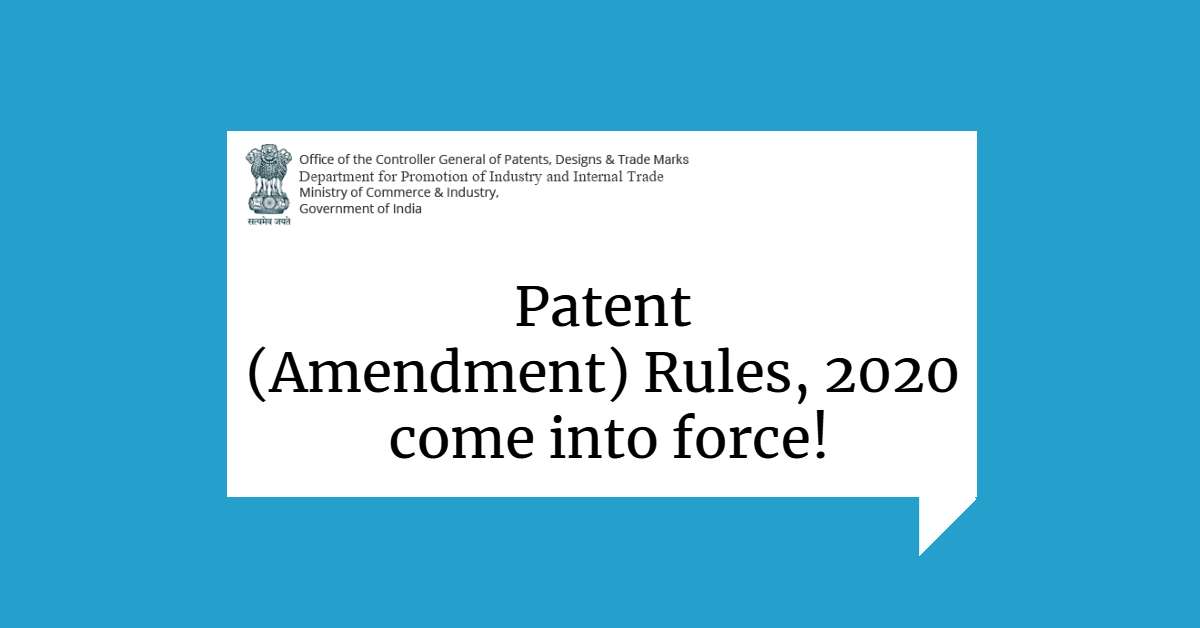On the 20th of October, 2020 the Central Government through an Official Gazette notification published the Patents (Amendment) Rules, 2020, containing the revised rules.
In summary, amendments have been made to the timeline and content required while submitting the Statement of Working of Patents (Form 27) for a granted Patent and in respect of the requirements for filing priority documents and its verified English translation for PCT national phase applications in India.
The highlights of the Revised Rules 2020 are broadly set out below:
1. Statement of Working of Patent (Form 27)
The amended rule 131(2) now states:
“(2) The statements referred to in sub-rule (1) shall be furnished once in respect of every financial year, starting from the financial year commencing immediately after the financial year in which the patent was granted, and shall be furnished within six months from the expiry of each such financial year.”
According to the amended rules, the statement of working of patent is to be filed by the patentee or licensee once every financial year, within six months from the expiry of such financial year (i.e. within September 31st of each year).
Further, the Form 27 format has also been revised, wherein a single Form 27 can now be filed for multiple patents, provided all the patents are related and the approximate revenue or value accrued from a single patent cannot be derived separately from the approximate revenue or value accrued from its related patents, and all such patents are granted to the same patentee or licensee.
2. Filing of Priority documents (Rule 21)
The amended Rule 21 states:
“(1) Where the applicant in respect of an international application designating India has not complied with the requirements of paragraphs (a), (b) or (b-bis) of rule 17.1 of the regulations under the Patent Cooperation Treaty, and subject to paragraph (d) of the said rule 17.1 of regulations under the Treaty, the applicant shall file the priority document referred to in that rule before the expiration of the time limit referred to in sub-rule (4) of rule 20 in the Patent Office”.
According to sub-rule(1), the applicant must file the priority document before the expiration of the time limit referred in sub-rule (4) of Rule 20, if the International application has not complied with the requirements of paragraphs of Rule 17 of the PCT regulations.
“(2) Where sub-paragraph (i) or sub-paragraph (ii) of paragraph (e) of rule 51bis.1 of the regulations under the Patent Cooperation Treaty is applicable, an English translation thereof duly verified by the applicant or the person duly authorised by him shall be filed within the time limit specified in sub-rule (4) of rule 20”.
According to sub-rule (2), an English translation of duly verified by the applicant of a person authorized by him must be filed within the time limit under sub-rule (4) of Rule 20, in cases where sub-paragraph (i) and (ii) of paragraph (e) Rule 5 of the PCT Regulations are applicable.
“(3) Where the applicant does not comply with the requirements of sub-rule (1) or sub-rule (2), the Patent Office shall invite the applicant to file the priority document or the translation thereof, as the case may be, within three months from the date of such invitation, and if the applicant fails to do so, the claim of the applicant for the priority shall be disregarded for the purposes of the Act.”
According to sub-rule (3), if the International applicants do not comply with Sub-rule (1) & (2), the Indian Patent Office will invite the applicant to submit the priority document or the English translations within three months from the date of the invitation. If the applicant fails to comply with the invitation, the Patent Office will not take the claimed priority into consideration.
In summary, the filing of the Priority document under Rule 21 have been amended to include the additional requirements of paragraphs (a), (b) or (b-bis) of Rule 17.1 of the Regulations under the Patent Cooperation Treaty. However, the timeline for submission of the priority document and its verified English translation remains the same.
Authored by Anjali S



